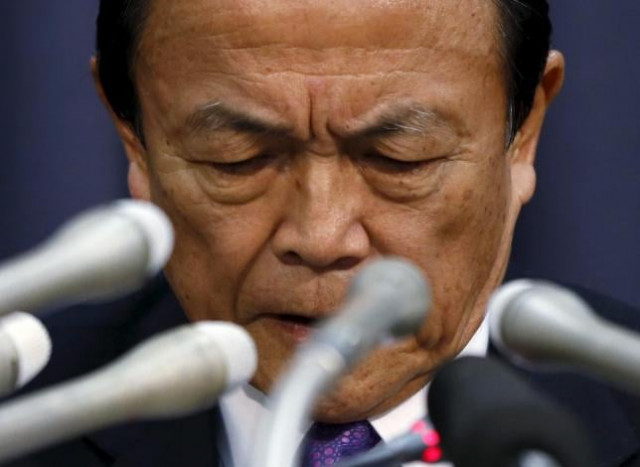Recent rise in yen 'extremely worrying': Japan finance minister
A strong currency is damaging for Japan's exporting giants, such as Toyota and Sony

PHOTO: REUTERS
The remarks, which suggest Tokyo's possible market intervention, came after the Japanese unit surged to an 18-month high against the dollar in New York Friday.
It extended the previous day's rally, which was boosted by a surprising monetary decision made by the Bank of Japan.
Japanese exports drop as strong yen clouds trade picture
On Thursday, the central bank shocked markets by failing to provide more stimulus, confounding expectations it would act after a double earthquake and a string of weak readings on the world's number three economy.
The dollar tumbled to 106.31 yen in New York Friday, its lowest level since October 2014, from 108.11 yen.
The greenback had bought 111.78 yen in Tokyo before the BoJ announcement on Thursday.
"The yen strengthened by five yen in two days. Obviously one-sided and biased, so-called speculative moves are seen behind it," Japanese Finance Minister Taro Aso told reporters at Haneda airport.
"It is extremely worrying," he said.
The finance minister left on a trip, which will also take him to an annual Asian Development Bank meeting in Germany.
Japan plants shut down after quake, fuels economic fears
"Tokyo will continue watching the market trends carefully and take actions when necessary," he added.
A strong currency is damaging for Japan's exporting giants, such as Toyota and Sony, as it makes their goods more expensive overseas and shrinks the value of repatriated profits.
Aso has reiterated that Japan could intervene in forex markets to stem the unit's steep rise, saying moves to halt the currency's "one-sided, speculative" rally would not breach a G20 agreement to avoid competitive currency devaluations.
Japan last intervened in currency markets around November 2011, when it tried to stem the yen's rise against the greenback to keep an economic recovery on track after the quake-tsunami disaster earlier that year.



















COMMENTS
Comments are moderated and generally will be posted if they are on-topic and not abusive.
For more information, please see our Comments FAQ